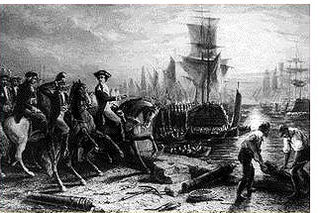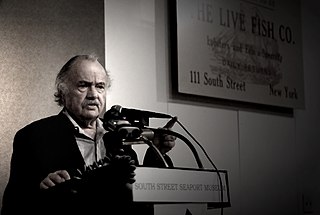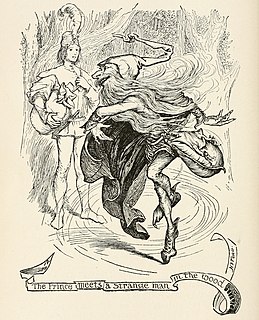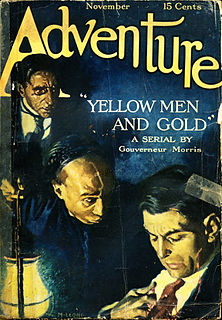Related Research Articles

Pulp magazines were inexpensive fiction magazines that were published from 1896 to the late 1950s. The term "pulp" derives from the cheap wood pulp paper on which the magazines were printed. In contrast, magazines printed on higher-quality paper were called "glossies" or "slicks". The typical pulp magazine had 128 pages; it was 7 inches (18 cm) wide by 10 inches (25 cm) high, and 0.5 inches (1.3 cm) thick, with ragged, untrimmed edges.

Lyme is a town in New London County, Connecticut, United States, situated on the eastern side of the Connecticut River. The population was 2,406 at the 2010 census. Lyme is the eponym for Lyme disease.

The Battle of Bunker Hill was fought on Saturday, June 17, 1775, during the Siege of Boston in the first stage of the American Revolutionary War. The battle is named after Bunker Hill in Charlestown, Massachusetts, which was peripherally involved in the battle. It was the original objective of both the colonial and British troops, though the majority of combat took place on the adjacent hill which later became known as Breed's Hill.

John Robert Fowles was an English novelist of international renown, critically positioned between modernism and postmodernism. His work was influenced by Jean-Paul Sartre and Albert Camus, among others.

The siege of Boston was the opening phase of the American Revolutionary War. New England militiamen prevented the movement by land of the British Army, which was garrisoned in what was then the peninsular city of Boston, Massachusetts Bay. Both sides had to deal with resource, supply, and personnel issues over the course of the siege. British resupply and reinforcement was limited to sea access, which was impeded by American vessels. The British abandoned Boston after eleven months and transferred their troops and equipment to Nova Scotia.

Ron Goulart is an American popular culture historian and mystery, fantasy and science fiction author.

A highwayman was a robber who stole from travellers. This type of thief usually travelled and robbed by horse as compared to a footpad who travelled and robbed on foot; mounted highwaymen were widely considered to be socially superior to footpads. Such criminals operated until the mid or late 19th century. Highwaywomen, such as Katherine Ferrers, were said to also exist, often dressing as men, especially in fiction.

John Alsop Jr. was an American merchant and politician from New York City. He signed the Articles of Confederation. He was a delegate for New York to the Continental Congress from 1774 to 1776.
Samuel Holden Parsons was an American lawyer, jurist, general in the Continental Army during the American Revolutionary War, and a pioneer to the Ohio Country. Parsons was described as "Soldier, scholar, judge, one of the strongest arms on which Washington leaned, who first suggested the Continental Congress, from the story of whose life could almost be written the history of the Northern War" by Senator George F. Hoar of Massachusetts
Blanche McCrary Boyd is an American author whose novels are known for their eccentric characters. She is currently the Roman and Tatiana Weller Professor of English and Writer-in-Residence at Connecticut College.

Elements of the supernatural and the fantastic were an element of literature from its beginning. The modern genre is distinguished from tales and folklore which contain fantastic elements, first by the acknowledged fictitious nature of the work, and second by the naming of an author. Works in which the marvels were not necessarily believed, or only half-believed, such as the European romances of chivalry and the tales of the Arabian Nights, slowly evolved into works with such traits. Authors like George MacDonald created the first explicitly fantastic works.
Nathan Hale was an American Revolutionary War officer who fought in the Battle of Lexington and Concord, Battle of Bunker Hill, Siege of Fort Ticonderoga, and Battle of Hubbardton. Hale was taken prisoner by the British at Hubbardton and died in prison on September 23, 1780 at New Utrecht, Brooklyn, New York.

Blue Book was a popular 20th-century American magazine with a lengthy 70-year run under various titles from 1905 to 1975. It was a sibling magazine to The Red Book Magazine and The Green Book Magazine.
Richard James Bleiler is an American bibliographer of science fiction, fantasy, horror, crime, and adventure fiction. He was nominated for the Bram Stoker Award for Best Non-Fiction in 2002 and for the Munsey Award in 2019. He is the son of Everett F. Bleiler.

Adventure was an American pulp magazine that was first published in November 1910 by the Ridgway company, an subsidiary of the Butterick Publishing Company. Adventure went on to become one of the most profitable and critically acclaimed of all the American pulp magazines. The magazine had 881 issues. Its first editor was Trumbull White, he was succeeded in 1912 by Arthur Sullivant Hoffman (1876–1966), who would edit the magazine until 1927.
Wilfred Langdon Kihn was a portrait painter and illustrator specializing in portraits of American Indians.

Dark Green, Bright Red is a novel by Gore Vidal, concerning a revolution headed by a former military dictator in an unnamed Central American republic. The book was first published in 1950 in the United States by E. P. Dutton. It drew upon Vidal's experiences living in Guatemala during the Guatemalan Revolution.
This is a complete bibliography of the written works of American fantasy author R. A. Salvatore.
Consider Tiffany was a British loyalist and storekeeper in Colonial America. He also served as a sergeant during the French and Indian War. He is described in the book The Tiffanys of America by Nelson Otis Tiffany: "in addition to making his living as a storekeeper and a farmer, was a brave soldier, good churchman, a writer of prose and poetry, and astronomer." To date, his journal is the only firsthand account written of Nathan Hale's capture during the American Revolution.
Stephen Johnson was a Congregationalist minister and pamphleteer from Lyme, Connecticut who wrote one of the first pamphlets condemning the Stamp Act.
References
- ↑ Susan Williams (2016). Spies in the Congo: The Race for the Ore that Built the Atomic Bomb. New York: Public Affairs. ISBN 9781610396547.
- ↑ Williams, Susan (August 13, 2016). "The Female Spy Who Kept Uranium Out of the Nazis' Hands". The Daily Beast.
- ↑ Connecticut Register and Manual, 1950, page 556
- ↑ "Donald Barr Chidsey, Biographer And Historian of the Revolution", New York Times, March 26, 1981
- ↑ Robinson, Frank M., and Davidson, Lawrence. Pulp Culture : The Art of Fiction Magazines. Portland, Or., Collectors Press 2001. ISBN 9781888054125 (p. 38)
- 1 2 3 Server, Lee, Encyclopedia of Pulp Fiction Writers. New York : Facts on File, 2008. ISBN 9781438109121 (pp. 63-64)
- 1 2 3 4 McGarry, Daniel D. McGarry, White, Sarah Harriman, Historical Fiction Guide: Annotated Chronological, Geographical, and Topical List of Five Thousand Selected Historical Novels. Scarecrow Press, New York, 1963 (pp. 59, 104, 179, 354)
- ↑ "End Papers" (review of The California Gold Rush), New York Times, October 24, 1968
- ↑ Donald Barr Chidsey. "THE GREAT CONSPIRACY". Kirkus Reviews.